If you have trouble sleeping, you're not alone
It's time for bed, or it ought to be. You're weary and worn out, but sleep — once again — proves elusive.
If you're consistently having trouble falling or staying asleep, you may have insomnia. And while it's a passing problem for some people, it can impair quality of life for others and contribute to additional health issues, including high blood pressure, obesity and diabetes.
We asked specialists sleep specialists at RUSH to share some key facts about insomnia.
1. Sleeplessness is more common than you think.
An estimated 40 million Americans cope with insomnia each year, and the Centers for Disease Control and Prevention considers it a serious public health problem.
In a 2008 study, two in five people who slept less than seven hours during a 24-hour period said they unintentionally fell asleep during the day, while nearly 5% reported nodding off while driving.
"Sleep can be a big factor in terms of U.S. productivity,” says James Herdegen, MD, a sleep medicine specialist at RUSH. "It's leading to billions of dollars of lost work productivity and increased risk of accidents.”
2. Not all insomnia is created equal.
Many people grapple with sleeplessness now and then, often due to stress from personal or economic issues. That's called acute insomnia.
It's when insomnia becomes chronic — lasting three months or longer and affecting family, work or other aspects of your overall health — that you should consider seeking help.
"The risk is if you let it go too long,” Herdegen says. "It now starts to become a part of your life in terms of poor sleep habits. We want to get people early so those types of things don't perpetuate.”
3. You can help yourself sleep better.
If you've been coping with sleep problems for a short period, there are steps you can take — before seeking help — that may help you get some rest.
"The most common recommendation I would make is to try to keep a regular sleep schedule seven nights a week, and really try to lock down the bedtime and wake-up times to be more consistent,” says James K. Wyatt, PhD, a behavioral sleep medicine specialist at RUSH.
That helps align the 24-hour clock in our brains — called the circadian system — with our desired sleep schedule. "And it will enhance our ability to remain awake during the day and sleep at night," he says.
Other tips include the following:
- Stay active: Exercise can help people sleep better and feel more alert, experts say. In fact, one study found that 150 minutes of moderate to vigorous activity each week led to a 65% improvement in sleep quality. Just make sure you're not working out too close to bedtime, which can actually be counterproductive, Wyatt says.
- Watch what you drink: Reduce your caffeine intake, and avoid it at least eight hours before bedtime. And go easy on the after-dinner drinks: While alcohol may help you fall asleep, it can interfere with a good night's sleep.
- Create a quiet, relaxing bedroom environment: That means no watching TV, playing video games, checking email on your smartphone, even reading.
Try to keep a regular sleep schedule seven nights a week, and really try to lock down the bedtime and wake-up times to be more consistent.
4. Medications can help, up to a point.
Nonprescription sleep aids will help you sleep, and they're OK on occasion, Herdegen says. The problem is that people can quickly develop tolerance to the drugs and may need to increase dosage to maintain effectiveness.
Prescription sleep medications also may be helpful in the short term but tend to work best when complemented by behavioral therapy aimed at getting at the root of the problem. "The ones out there do work, but they don't work in isolation," he says.
Meanwhile, Herdegen cautions against putting too much faith in herbal supplements like teas or valerian root, noting that they haven't been rigorously studied so their effectiveness is unclear. Some who find them beneficial may actually be experiencing a placebo effect, he says.
5. Insomnia is treatable.
If your insomnia persists, don't try to go it alone, as there's a strong likelihood it can be effectively treated. And you can start by contacting your primary care physician.
"They can look at the most common conditions that could be causing or worsening a sleep problem," Wyatt says. Those conditions may include thyroid disorders, anxiety, depression, menopausal symptoms and nighttime asthma attacks.
Your doctor may refer you to sleep specialists like those at RUSH. The team at RUSH includes experts in behavioral sleep medicine, neurology and pulmonary medicine, and it consults with other specialists at RUSH, including sleep surgeons.
To help with diagnosis, doctors may have you maintain a log or wear a device to help better understand your routine and track when you're sleeping.
In some cases, experts may recommend a sleep study. It typically involves an overnight stay at a lab, where experts monitor a variety of biological functions during sleep, including brain activity, eye movement, heart rate and blood pressure, via electrodes attached to the patient's skin.
A sleep study isn't a necessity for patients whose main problem is trouble falling asleep, absent other symptoms, Wyatt says. "If somebody is having difficulty breathing at night, as evidenced by loud snoring, or witnessed pauses in breathing during sleep, or awakening with shortness of breath, these are all signs of obstructive sleep apnea. And that's when a sleep study is imperative," he says.




